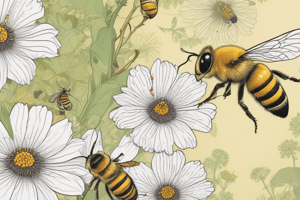Podcast
Questions and Answers
What is the primary cause of the decline in pollinator populations according to the text?
What is the primary cause of the decline in pollinator populations according to the text?
- Intensive farming practices, mono-cropping, and excessive use of pesticides (correct)
- Habitat destruction
- Invasive species
- Deforestation
What is one potential consequence of the decline in pollinator populations mentioned in the text?
What is one potential consequence of the decline in pollinator populations mentioned in the text?
- Increased use of organic farming methods
- Increased crop yields
- Improved biodiversity
- Reduced availability of nutrient-rich fruits, nuts, and vegetables (correct)
Which of the following measures is the FAO advocating to mitigate the threats to pollinator species?
Which of the following measures is the FAO advocating to mitigate the threats to pollinator species?
- Promoting monoculture farming practices
- Improving habitats, restricting pesticide use, boosting biological pest control, and diversifying farms (correct)
- Reducing habitat diversity
- Increasing the use of pesticides
What is the potential impact of the measures advocated by the FAO to protect pollinators?
What is the potential impact of the measures advocated by the FAO to protect pollinators?
Why is the conservation of pollinators essential according to the text?
Why is the conservation of pollinators essential according to the text?
What is the primary purpose of artificial pollination?
What is the primary purpose of artificial pollination?
What is the difference between cross-pollination and hybridization?
What is the difference between cross-pollination and hybridization?
What is a potential risk associated with cross-pollination?
What is a potential risk associated with cross-pollination?
What is a potential benefit of hybridization?
What is a potential benefit of hybridization?
What is a potential drawback of inappropriate usage of artificial pollination?
What is a potential drawback of inappropriate usage of artificial pollination?
Flashcards are hidden until you start studying
Study Notes
Pollination: An Essential Process and Its Dependence on Pollinators
Pollination plays a crucial role in agriculture and food production, enabling the growth and reproduction of a wide range of plants, including many fruit, nut, and seed-producing crops. Without pollinators, such as bees, the global agriculture landscape would be drastically different. Here's a detailed look at this vital process and the essential role of pollinators in maintaining a balanced ecosystem:
Understanding Pollination
Pollination is the process by which pollen from male parts (anthers) of a flower is transferred to the female part (stigma) of another flower, resulting in fertilization and subsequent fruit or seed development. This process is critical for plant reproduction and crop production. Agents that facilitate pollination include wind, insects (like bees), birds, and bats.
Essential Role of Pollinators
Pollinators are key contributors to 75% of all crops worldwide, with nearly three-quarters of these crops depending on them to some extent. Some examples of crops that rely heavily on pollinators include coffee, apples, almonds, tomatoes, and cocoa. The work of pollinators is so significant that it contributes more to global yield increases than any other factor, according to the Food and Agriculture Organization of the United Nations (FAO).
Threatened Species and Implications
Unfortunately, many species of pollinators, particularly insects like bees, are under threat due to factors such as intensive farming practices, mono-cropping, excessive use of pesticides, climate change, and pollution. This decline in pollinator populations can lead to reduced crop yields, imbalanced diets, and even a shift towards staples such as rice and potatoes instead of nutrient-rich fruits, nuts, and vegetables. Additionally, this decrease in pollinator populations can negatively impact biodiversity, affecting the entire natural ecosystem.
Preserving Pollinators
To mitigate these threats and preserve pollinator species, the FAO advocates several measures, including improving habitats, restricting pesticide use, boosting biological pest control, and diversifying farms to create a balanced ecosystem for bees and their fellow pollinators. These improvements have the potential to increase crop yields by a quarter, ensuring the continued importance of pollinators in agriculture and food production.
In conclusion, pollination is a vital process that relies heavily on pollinators like bees, insects, birds, and bats. Their decline poses a serious threat to global food security, biodiversity, and the planet's health. Efforts to protect and conserve these critical creatures, along with their environments, are essential for maintaining a healthy and sustainable agricultural system.
Studying That Suits You
Use AI to generate personalized quizzes and flashcards to suit your learning preferences.




